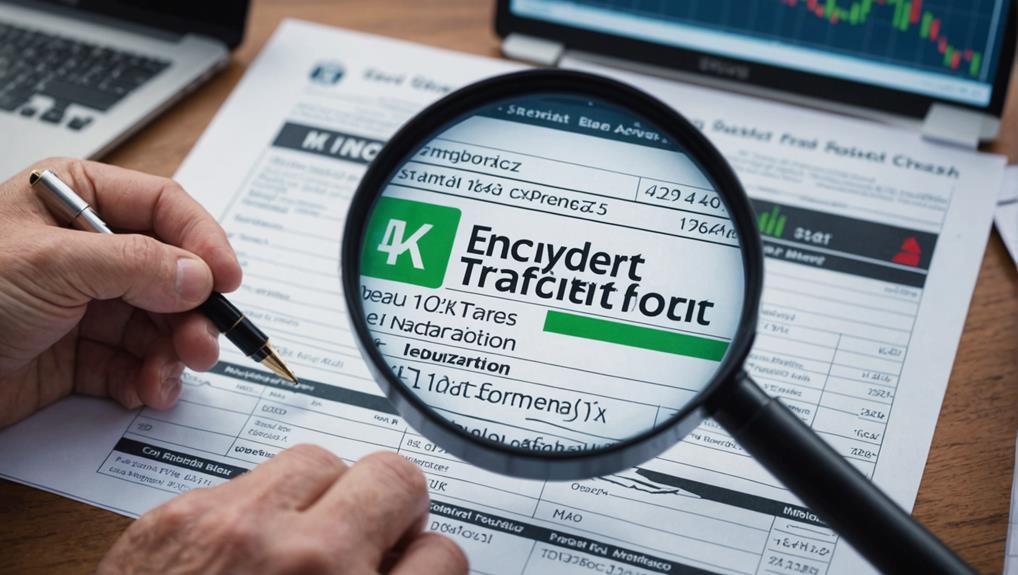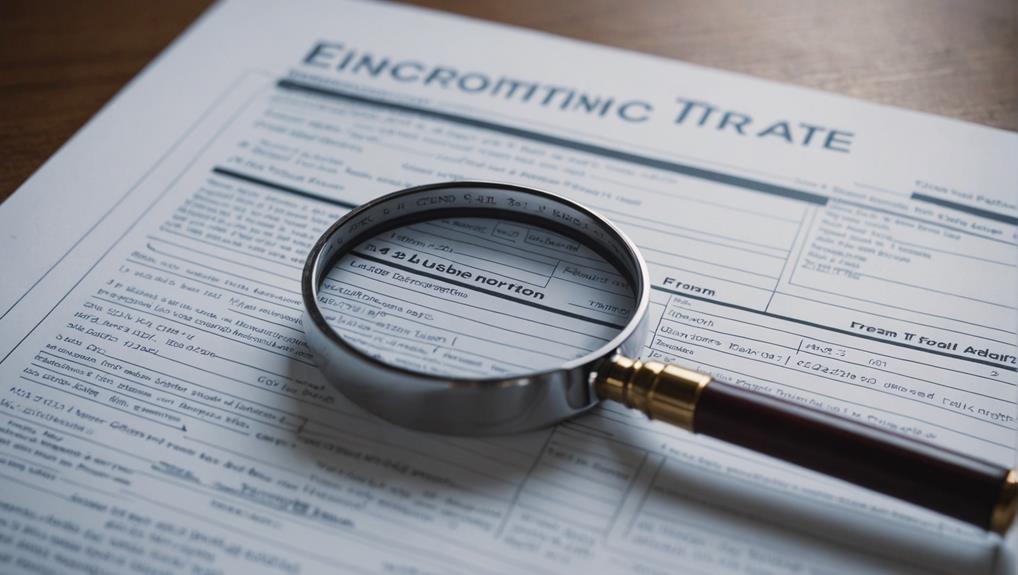SEC Form 4: Monitoring and Regulating Insider Trading for Market Integrity

SEC Form 4 plays a crucial role in upholding market integrity by overseeing insider trading activities. Insiders, such as company executives or significant shareholders, must promptly report their stock transactions within two business days. This requirement ensures transparency, reducing information disparities and fostering a fair trading environment for all market participants.
The Securities and Exchange Commission (SEC) relies on Form 4 to monitor alterations in beneficial ownership, thus safeguarding against unfair advantages and bolstering investor trust in the market. These filings are publicly available, offering immediate insights into insider sentiment and behavior, enabling stakeholders to comprehend the rationale behind notable market shifts and investor actions.
Key Takeaways
SEC Form 4 plays a crucial role in upholding market integrity by ensuring that insider transactions are promptly disclosed, maintaining transparency in the financial markets. Insiders are required to report their stock transactions using SEC Form 4 within two business days, which helps reduce information asymmetry among market participants. This timely reporting requirement prevents any unfair trading advantages by swiftly revealing any changes in beneficial ownership by company insiders.
Regular monitoring of Form 4 filings is essential as it aids in the detection and deterrence of potential insider trading violations. By enforcing compliance with Form 4 regulations, the SEC enhances investor confidence and promotes a fair and level playing field in financial markets. The disclosure of insider transactions through Form 4 filings is a critical component in safeguarding the integrity of the market and ensuring that all investors have access to relevant information for making informed decisions.
Importance of SEC Form 4
SEC Form 4 plays a crucial role in maintaining market transparency by promptly disclosing insider transactions. This form, mandated by the Securities Exchange Act of 1934, ensures that changes in beneficial ownership by corporate insiders, such as officers, directors, and significant shareholders, are reported within two business days. Adhering to this regulatory framework enhances market integrity, reduces information asymmetry, and promotes fairness.
Analyzing SEC Form 4 filings provides real-time insights into insider transactions, aiding in making well-informed investment decisions. These filings unveil the buying and selling activities of individuals with intimate knowledge of a company's operations and future prospects, offering strategic clues about insider sentiment and the company's trajectory.
Incorporating this data into investment strategies enables staying ahead of market trends and making decisions based on comprehensive information. The timely disclosure mandated by Form 4 not only upholds market integrity but also empowers investors to assess companies' financial health and growth potential more accurately. Understanding and leveraging these filings are essential for effectively navigating today's complex market landscape.
Understanding Insider Trading
When discussing insider trading, we must consider both the legal framework and ethical implications involved. Insider trading laws, such as those enforced by regulatory bodies like the Securities and Exchange Commission (SEC), are designed to prevent individuals who've access to nonpublic information from gaining an unfair advantage in the market. Ethically, it's crucial to recognize that engaging in insider trading undermines investor trust and compromises the transparency of the market.
One important aspect related to insider trading is the SEC Form 4, which requires the disclosure of changes in ownership of company stock by insiders. This form is a crucial tool in maintaining transparency and ensuring that investors have access to relevant information regarding insider transactions. By mandating the reporting of such changes, the SEC Form 4 helps to prevent potential abuses of insider information and promotes a more level playing field for all market participants.
It is essential for insiders to comply with the requirements of the SEC Form 4 to uphold the integrity of the market. Failure to accurately report changes in ownership can lead to legal repercussions and damage the reputation of both the individual and the company involved. By adhering to the regulations set forth by the SEC, insiders can help foster a more fair and trustworthy investment environment for all stakeholders.
Legal Framework Overview
Insider trading laws aim to prevent individuals with privileged information from taking advantage of market opportunities at the expense of other investors. These laws are essential for maintaining market integrity by regulating Insider Trading Activity.
The key element in this regulatory framework is SEC Form 4, which plays a crucial role in ensuring transparency and compliance with the Securities and Exchange Commission's rules.
SEC Form 4 requires insiders to report their trades, providing a mandatory disclosure of insider transactions. This disclosure promotes transparency and accountability in the financial markets, allowing investors to make informed decisions based on accurate and up-to-date information.
By mandating the disclosure of changes in ownership of company stock by insiders, SEC Form 4 helps prevent unfair advantages and enhances investor confidence in the market.
Compliance with insider trading laws and regulations, such as the disclosure requirements of SEC Form 4, is vital for preventing legal and ethical breaches. By adhering to these regulations, insiders contribute to maintaining fairness and investor protection in the financial markets.
Ethical Considerations Explained
Understanding the ethical considerations of SEC Form 4 is crucial for ensuring transparency and trust in financial markets. When insiders are required to disclose changes in their ownership of company stock, it helps prevent unfair advantages and promotes fairness. Compliance with SEC regulations not only upholds market integrity but also builds confidence among investors.
Regulatory bodies like the SEC play a vital role in enforcing these ethical standards. They ensure that insiders follow the rules and disclose their transactions promptly. By adhering to these regulations, we create a level playing field where everyone has access to the same information.
Fairness is maintained by ensuring that no one can exploit privileged information for personal gain. Transparency is upheld through the mandatory disclosure of insider transactions, providing investors with essential information for making informed decisions. Trust is built by demonstrating a commitment to ethical behavior and regulatory compliance.
Compliance with SEC Form 4 requirements is essential for sustaining a healthy financial ecosystem. By prioritizing ethical considerations and following regulatory guidelines, we contribute to a market environment that's based on integrity and fairness. This not only benefits individual investors but also supports the long-term health and stability of financial markets.
Role of the SEC

The SEC enforces federal securities laws and supervises insider transactions to maintain market integrity and protect investors. As the Securities and Exchange Commission, our role in the financial ecosystem is crucial. We strive to curb insider trading and ensure that all market participants operate on a level playing field. Through establishing protocols for the ownership and exchange of securities, including the meticulous requirements for Form 4 filings, we enhance transparency and reduce information asymmetry.
Our regulatory oversight doesn't stop at policing; it extends to nurturing investor confidence. When investors are aware that insider transactions are closely monitored, they can rely on the fairness and efficiency of the market. Timely and accurate Form 4 filings are imperative for this transparency, enabling us to monitor any potentially unethical activities.
Innovations in our regulatory practices are essential to staying ahead of evolving market dynamics. By adapting to new financial instruments and trading strategies, we uphold market integrity. This vigilance reassures investors that their interests are protected, strengthening their confidence in the system.
Ultimately, our dedication to rigorous oversight and transparency forms the foundation upon which fair and efficient markets thrive.
What Is SEC Form 4?
SEC Form 4, a vital regulatory tool, mandates that corporate insiders such as directors and officers report their transactions in company securities. This requirement, established under the Securities Exchange Act of 1934, is crucial for maintaining transparency in the financial markets. Whenever corporate insiders conduct transactions like buying, selling, or exercising options, they must file Form 4 within two business days.
The prompt submission of SEC Form 4 holds significant importance for several reasons. Firstly, it ensures transparency by providing equal access to information for all market participants, thus reducing information asymmetry. Secondly, by disclosing insider transactions, Form 4 plays a key role in preserving trust and integrity within the financial markets. Lastly, investors leverage this data to assess insider sentiment, enabling them to make more informed investment decisions.
Understanding the intricacies of SEC Form 4 is paramount for those with an interest in innovation. Compliance with these reporting requirements goes beyond mere adherence to rules; it fosters a market environment characterized by transparency and trust. When corporate insiders comply with these standards, they contribute to a fairer playing field, boosting investor confidence and maintaining the integrity of our financial systems. Ultimately, this practice promotes a healthier and more dynamic market landscape.
Legal Context

To delve into the legal landscape surrounding insider trading, we need to understand the significance of SEC Form 4. This form is a crucial disclosure document that insiders of a company must submit to the Securities and Exchange Commission (SEC) whenever there are changes in their ownership of company stock.
Insiders, such as company executives, directors, and large shareholders, are required by law to report their transactions in company stock promptly, typically within two business days of the transaction.
The purpose of SEC Form 4 is to provide transparency and accountability in the financial markets. By requiring insiders to disclose their transactions, investors and the public can have a clearer picture of any potential conflicts of interest or market manipulation. This level of disclosure helps to maintain market integrity and investor confidence by ensuring that relevant information is promptly and accurately shared with all stakeholders.
Failure to comply with SEC Form 4 reporting requirements can result in severe penalties, including fines and even criminal charges. The SEC actively enforces these rules to deter insider trading and promote a level playing field for all investors.
Insider Trading Laws
Regulatory frameworks for insider trading laws are crucial for maintaining market integrity and fairness. Insider trading, the act of trading securities based on material nonpublic information, violates securities laws and disrupts market balance.
Compliance with insider trading regulations is vital for directors, officers, and other insiders to prevent unfair advantages and market manipulation.
Regulatory authorities, such as the Securities and Exchange Commission (SEC) and the International Organization of Securities Commissions (IOSCO), play a key role in overseeing and enforcing these regulations. Their goal is to ensure transparency, uphold investor confidence, and promote a level playing field in financial markets.
Violations of insider trading laws can result in significant consequences, including fines, imprisonment, and damage to one's reputation.
One important aspect of insider trading laws is the requirement for insiders to disclose changes in ownership of company stock through SEC Form 4. This form is a mandated disclosure for insiders, ensuring transparency and accountability in their trading activities.
By making this information publicly available, investors and regulators can monitor insider transactions and detect any potential misconduct or abuse of privileged information.
In conclusion, regulatory frameworks for insider trading laws, including the requirement for insiders to disclose changes in ownership through SEC Form 4, are essential for upholding market integrity and fairness. Compliance with these regulations is necessary to avoid legal repercussions and maintain public trust in the financial markets.
Reporting Requirements Overview
Insiders must report changes in beneficial ownership using Form 4 within two business days of any transaction to maintain transparency in financial markets. This requirement is crucial for upholding market integrity and keeping stakeholders informed about insider trading activities.
By complying with SEC Form 4 reporting obligations, insiders like directors and officers provide detailed information about their transactions, including purchases, sales, and stock options. This prompt disclosure isn't only a legal mandate under the Securities Exchange Act of 1934 but also a cornerstone of our market's transparency initiatives.
Real-time insights into insider sentiment and ownership changes are vital for investors and regulators alike.
Timely reporting of these transactions helps prevent any unfair advantage that may result from undisclosed insider activities. It aims to level the playing field, ensuring that everyone, irrespective of their position, has equal access to information. Upholding these reporting standards reinforces trust and integrity within our financial systems.
Ultimately, the transparency facilitated by SEC Form 4 filings fosters a more informed and fair market environment. It signifies our commitment to robust oversight and ethical trading practices.
Penalties and Enforcement
Enforcement of penalties for insider trading is crucial to uphold market integrity. Stringent legal measures and proactive enforcement actions are essential in deterring such illegal practices. Penalties for insider trading violations are severe to reflect the seriousness of the offense.
In the United States, offenders can be fined up to $5 million and face imprisonment for up to 20 years, while in India, penalties can reach INR 250,000,000 or triple the illicit profits. Regulatory authorities play a vital role in enforcing these penalties and ensuring compliance. High-profile cases like the conviction of Rajat Gupta for passing confidential information serve as stark reminders of the consequences of insider trading violations.
Regulatory bodies such as the SEC in the U.S. are vigilant in identifying and prosecuting offenders. The SEC Form 4 is a crucial tool in monitoring insider trading activities. It requires the disclosure of changes in ownership of company stock by insiders, providing transparency and accountability in the market.
Entities Involved
Corporate insiders, such as directors, officers, and major shareholders, play crucial roles in SEC Form 4 filings. These insiders must report any changes in beneficial ownership through Form 4, promoting transparency in their trading activities. This requirement helps monitor and regulate insider transactions, which is vital for maintaining market integrity.
Significant shareholders, owning more than 10% of a company's shares, are also obligated to file Form 4. This ensures that any substantial transactions that could impact market dynamics are promptly disclosed. The SEC oversees these filings to enhance transparency and prevent potential insider trading.
Form 4 disclosures provide a valuable tool for regulators and market participants by tracking insider sentiment and ownership changes, enabling a better understanding of potential market impacts. This transparency fosters a more reliable trading environment, deterring unethical practices.
In essence, SEC Form 4 filings serve as a critical mechanism for promoting transparency and integrity within the market. Involving insiders and significant shareholders in this regulatory process enhances overall market confidence and ensures a fair playing field for all participants.
Investor Implications

Investors heavily rely on SEC Form 4 filings to gain immediate insights into insider transactions, which can significantly impact their investment strategies. Analyzing these filings allows us to interpret insider sentiment and evaluate a company's financial well-being, crucial for making well-informed investment decisions.
Decoding Form 4 filings serves as a strategic guide for navigating market sentiment. Insider buying typically indicates a positive outlook, showcasing confidence in the company's future prospects. Conversely, insider selling may signal a more negative sentiment, potentially highlighting underlying issues. These observations empower investors to:
- Assess market sentiment: Gain valuable insights into the prevailing attitudes of individuals closely associated with the company.
- Evaluate financial stability: Utilize insider transactions as indicators of a company's economic strength and future potential.
- Drive investment choices: Make informed decisions, reducing uncertainty and enhancing potential returns.
The significance of SEC Form 4 in upholding market integrity can't be overstated. It acts as an early detection system, a research aid, and an idea generator, enabling us to stay ahead of market trends. By leveraging this data, we align our strategies with the actions of those with the deepest understanding of the company. This approach ensures that our investment decisions are both strategic and data-informed.
Impact on Stock Price
Insider trading can have a direct impact on stock prices, particularly when insiders disclose their transactions through SEC Form 4 filings. These filings are required to report changes in ownership of company stock by insiders, providing transparency to investors. When significant insider transactions are revealed through Form 4 filings, the market often reacts swiftly, reflecting changes in investor sentiment and confidence in the company.
Investors closely monitor these Form 4 disclosures as they're seen as indicators of future company performance. Positive or negative transactions by insiders can lead to immediate price movements as market participants adjust their positions based on this information. Over time, these reactions can shape long-term price trends, making it crucial to track and regulate insider activities to ensure the integrity of the market.
Immediate Market Reaction
Understanding the immediate market reaction to insider trading disclosures is crucial for assessing stock price movements. Insider transactions reported through SEC Form 4 filings can swiftly impact stock prices, providing valuable insights into insider sentiment.
The market response to SEC Form 4 filings can be substantial, influenced by changes in investor confidence and perceptions of the company's future. Positive insider buying typically indicates faith in the company's potential, potentially driving stock prices higher. Conversely, insider selling may raise red flags and lead to stock price declines.
Investors keenly observe these filings to decipher the implications of insider trading activities. The immediate market reaction to SEC Form 4 disclosures often involves heightened scrutiny of insider transactions, prompting quick adjustments in stock prices based on trade specifics.
These reactions reflect shifts in investor confidence and their assessments of the company's future value.
Investor Confidence Shifts
The market response to insider trading disclosures illustrates how changes in investor confidence can significantly impact stock prices. Significant insider buying, as reported in SEC Form 4 filings, tends to boost investor confidence. This is because such insider transactions indicate positive sentiment towards the company's future, leading to an increase in stock prices. Investors see these actions as a strong vote of confidence from individuals who've intimate knowledge of the company.
On the other hand, substantial insider selling can diminish investor confidence. When Form 4 filings show large-scale selling by insiders, it can result in a decrease in stock price. Market sentiment may turn negative as investors interpret these transactions as a sign of possible concerns or a lack of belief in the company's performance.
These shifts in sentiment play a crucial role in driving stock price movements based on how investors perceive the actions of insiders.
Long-term Price Trends
Insider trading activities, as disclosed in SEC Form 4 filings, play a significant role in shaping long-term price trends in the stock market. These filings provide crucial information about transactions made by company executives and directors, influencing investor sentiment and predicting stock price movements.
Analyzing Form 4 filings can reveal patterns that offer valuable insights into future stock performance. For instance, significant insider purchases often indicate confidence in the company's growth prospects, leading to potential increases in stock prices as investors view these actions positively.
On the other hand, sustained insider selling may signal concerns about the company's outlook, resulting in downward pressure on stock prices as investors become cautious.
Breaking Down Form 4

SEC Form 4 is a crucial document that insiders, such as company directors and officers, use to report changes in their ownership of company stock. This form provides detailed information on transactions like purchases, sales, and stock options. By requiring insiders to submit Form 4, the SEC ensures transparency in insider trading activities, which is essential for maintaining the integrity of the market.
When insiders complete and submit Form 4, they aren't only meeting regulatory obligations but also enhancing market transparency. Investors and analysts closely monitor these filings to assess insider sentiment towards a company. For example, a series of insider purchases may indicate confidence in the company's future prospects, while significant sales might raise concerns.
The prompt filing of Form 4 within two business days is crucial for providing the market with current information on insider transactions. This information is vital for investors to make well-informed decisions.
Form 4 serves as a fundamental tool for upholding market integrity and promoting trust and transparency in the financial markets.
Key Terms Explained
In delving into the essential terms related to insider trading, it's crucial to understand SEC Form 4. This form is a required disclosure that insiders of a company must submit to the Securities and Exchange Commission (SEC) whenever there are changes in their ownership of company stock.
Insiders, such as directors, officers, and shareholders owning more than 10% of the company's stock, are mandated to report their transactions promptly to ensure transparency in the market.
The purpose of SEC Form 4 is to provide investors and the public with information about insider transactions, which can include purchases, sales, and even gifts of company stock. This disclosure requirement helps investors make informed decisions by allowing them to track insider activities and assess the possible impact on the company's future performance.
By ensuring that insiders report their transactions promptly, the SEC Form 4 helps maintain market integrity and protects the interests of investors.
Failure to comply with the reporting requirements outlined in SEC Form 4 can lead to severe penalties for insiders. These penalties can include fines, sanctions, and even legal action by regulatory authorities.
Insider Trading Explained
Understanding insider trading begins with grasping the significance of the SEC Form 4, a vital document that helps monitor transactions involving company securities. This form mandates that corporate insiders disclose their trades, ensuring transparency and aiding regulatory authorities in identifying any potentially harmful market activity.
The SEC Form 4 serves as a critical tool in overseeing changes in ownership of company stock by insiders. By requiring these disclosures, regulatory bodies can better detect any suspicious behavior that may compromise market fairness.
Insider trading, the unlawful practice of trading securities based on confidential information, poses a threat to market integrity. This illegal activity undermines the principles of fairness, transparency, and efficiency that are essential for a healthy marketplace.
Nonpublic information, data not accessible to the general public, can significantly impact investment decisions. When individuals with access to such information engage in insider trading, they exploit an unfair advantage that harms the trust and stability of the financial markets.
Abiding by insider trading laws is crucial for upholding trust and safeguarding investors. Compliance with regulations promotes a level playing field and contributes to a more transparent and equitable market environment.
Reporting Requirements Overview
When delving into reporting requirements, let's dissect essential terms such as beneficial ownership, transaction codes, and filing deadlines to simplify the intricacies of SEC Form 4.
Form 4 submissions play a crucial role in upholding market integrity by offering transparency on insider transactions. Let's first tackle beneficial ownership, which pertains to an insider's direct or indirect control over securities. This principle ensures that all involved parties holding a significant stake in a company are answerable for their trades.
Moving on to transaction codes, these codes specify the nature of each insider transaction. For example, 'A' denotes a grant or award, indicating an acquisition of shares, while 'S' signifies a sale. These codes serve as a handy guide to grasp the type of insider activity being reported.
Lastly, strict adherence to filing deadlines is imperative. Insiders must file Form 4 reports within two business days following the transaction, guaranteeing prompt disclosure to the public.
Let's summarize these key terms in a table for quick reference:
| Key Term | Description |
|---|---|
| Beneficial Ownership | Insider's control over securities |
| Transaction Codes | Codes indicating transaction nature |
| Filing Deadlines | Submission within two business days |
| Form 4 Filings | Mandatory reports on insider transactions |
| Insider Transactions | Trades executed by company insiders |
Understanding these elements demystifies the reporting requirements, fostering a more transparent market.
Compliance and Penalties
Compliance measures in financial firms play a crucial role in preventing insider trading and maintaining market integrity. These measures include robust programs with policies, training sessions, monitoring systems, and regular audits. They're essential for identifying and mitigating risks associated with SEC Form 4 filings and insider trading activities.
Penalties for insider trading can be severe, aimed at deterring illegal practices and upholding market integrity. Consequences may involve imprisonment and significant fines. The case of Rajat Gupta, convicted for sharing confidential information, highlights the seriousness of enforcement actions. Penalties for insider trading vary globally:
- In the U.S., fines can reach up to $5 million, with a maximum prison sentence of 20 years.
- In India, fines can go up to INR 250,000,000 or triple the illicit profits.
Technology plays a crucial role in enhancing compliance efficiency through automation, data analytics, and AI detection. Technology serves as a valuable asset in compliance efforts by automating processes, utilizing data analytics, and employing AI to detect suspicious activities. These innovations streamline compliance tasks and reduce the risks associated with insider trading.
The SEC's strict enforcement of regulations with severe penalties ensures that market participants adhere to ethical standards. It's essential for financial innovators to prioritize compliance to uphold market trust and integrity, creating a fair, transparent, and robust market environment.
Insider Transactions

Insider transactions, as revealed in SEC Form 4 filings, provide crucial insights into the confidence levels and potential future stock movements of corporate insiders. These transactions, such as purchases, sales, or the exercise of company securities, offer a direct glimpse into the sentiments of individuals with deep knowledge of a company's operations.
SEC Form 4 serves as a key tool for monitoring these activities, upholding market integrity, and ensuring compliance with securities regulations.
When corporate officers, directors, or significant shareholders engage in transactions involving company securities, they must promptly file a Form 4 within two business days. This transparency in disclosing changes in beneficial ownership enables investors to track insider behavior and evaluate their levels of confidence in the company.
Analyzing these transactions can inform our investment decisions by providing a unique perspective on potential future stock performance.
Keeping a close watch on insider transactions through SEC Form 4 goes beyond seeking profitable opportunities; it also contributes to market transparency and the detection of unusual activities. By attentively monitoring these disclosures, we actively participate in creating a fairer and more trustworthy marketplace.
Essentially, these filings offer a window into the strategic decisions of individuals closely connected to the company, furnishing us with valuable data to navigate the intricacies of investing.
Legal Implications
Understanding insider transactions is just the tip of the iceberg; we must also grasp the legal implications to fully appreciate the importance of regulatory compliance in maintaining market integrity. When insiders trade securities based on material nonpublic information, they not only violate SEC regulations but also undermine the fairness of our financial markets.
Compliance with insider trading laws is vital for investment professionals. The SEC Form 4 is a crucial tool in monitoring these transactions, ensuring transparency and accountability. Failure to follow these regulations can lead to severe consequences such as imprisonment and substantial fines, serving as deterrents against illegal practices.
Strict enforcement of insider trading laws guarantees a level playing field for all market participants, ensuring market fairness. Upholding these regulations protects investors from fraudulent activities, maintaining their trust and confidence in the financial system. Collaboration with international bodies like IOSCO helps establish global standards, harmonizing and strengthening regulatory frameworks worldwide.
The legal implications of insider trading underscore the importance of ethical standards and regulatory compliance in maintaining market integrity. Vigilance in adhering to these laws is essential for nurturing a robust and trustworthy financial ecosystem.
Accessing SEC Form 4

By accessing the SEC's EDGAR system, we can easily retrieve Form 4 filings to monitor insider trading activities. This allows us to stay informed about changes in ownership of company stock by insiders in real-time.
When company executives or directors buy or sell shares, they're required to file an SEC Form 4. This form provides details on the transaction type, the number of securities involved, and the transaction date.
To track insider activities, we search for specific company filings on the SEC's website. This transparency enables us to make well-informed decisions and assess insider sentiment.
Moreover, the EDGAR system offers the flexibility to set up alerts, ensuring timely notifications whenever new Form 4 filings are submitted. These alerts play a crucial role in keeping us updated on significant insider transactions.
Monitoring insider transactions through SEC Form 4 filings helps us interpret potential market movements and investor confidence within a company. By closely monitoring these filings, we can anticipate changes in market dynamics more effectively.
The EDGAR system, with its comprehensive database and alert features, is an essential tool for tracking insider trading and upholding market integrity.
Interpreting Insider Signals
Now that we know how to access SEC Form 4 filings, let's delve into deciphering the insider signals they unveil. Decoding these signals helps us grasp market sentiment and anticipate potential movements in stock prices. When insiders like executives or directors engage in notable trades, they provide valuable insights into the company's upcoming trajectory.
By scrutinizing Form 4 filings, we can spot crucial trends:
- Substantial purchases typically signify a strong belief in the company's future performance.
- Sizeable sales may hint at internal concerns or imminent organizational changes.
- A blend of buying and selling activities can indicate nuanced perspectives on market conditions.
Investors can utilize these insider signals to make well-informed choices. For example, a cluster of significant insider purchases could indicate an undervalued stock, prompting a buy. Conversely, widespread insider sales might serve as a warning sign, urging caution in decision-making.
Case Study: Silicon Valley Bank
Silicon Valley Bank insiders' recent transactions, disclosed on SEC Form 4, provide a glimpse into the company's internal sentiment and strategic direction. These filings allow us to track the actions of key executives and board members, giving us valuable insights into their confidence or concerns regarding the bank's future performance.
The SEC Form 4 reports from Silicon Valley Bank insiders unveil a pattern of stock purchases and sales, showcasing their strategic moves and market outlook. Such disclosures are crucial for upholding market transparency, aiding investors in assessing the company's internal perspective.
Analysis of recent Form 4 filings reveals a variety of sentiments among insiders. Purchases of shares may indicate optimism about the bank's growth prospects, while sales could reflect diversification of portfolios or responses to market conditions. Monitoring these transactions enables us to identify patterns in insider trading that could serve as indicators for broader market trends.
Frequently Asked Questions
Who Is Required to File SEC Form 4?
If you are a corporate insider, such as an officer, director, or if you own over 10% of the company's stock, you are required to file SEC Form 4. This form is essential for insider disclosure, ensuring transparency in trading practices. By adhering to strict filing requirements and reporting obligations, insiders help maintain compliance with regulatory guidelines.
What Does SEC Form 4 Transaction Code a Mean?
Transaction Code A on SEC Form 4 signifies an insider's acquisition of company shares through equity awards. This code reflects the insider's purchase activity and any resulting changes in beneficial ownership. By disclosing these transactions, insiders fulfill their regulatory reporting obligations. Monitoring these transaction codes enables investors to gauge insider sentiment and potentially anticipate stock price movements.
What Is Form S 4 for SEC Review?
Form S-4 is a crucial document that companies use to register securities involved in mergers or business combinations with the Securities and Exchange Commission (SEC). This form outlines the necessary merger requirements, share exchange terms, and includes a comprehensive registration statement. Companies must adhere to filing deadlines and go through the amendment process to ensure compliance and maintain transparency throughout the merger or business combination process.
Form S-4 is an important regulatory requirement that helps investors and stakeholders understand the details of a merger or business combination. It provides essential information about the transaction, including financial statements, risk factors, and legal implications. By filing Form S-4, companies demonstrate their commitment to following SEC regulations and providing transparency to their shareholders.
What Happens if Form 4 Is Filed Late?
Filing Form 4 late can lead to penalties and legal consequences. These penalties are enforced by the Securities and Exchange Commission (SEC) to ensure transparency and accountability in the market. When insiders fail to report their transactions promptly, it can raise concerns about market manipulation and erode investor confidence.
In the world of finance, compliance is crucial for maintaining market integrity. The timely and accurate reporting of insider transactions is essential to provide investors with the information they need to make informed decisions. Failure to adhere to these compliance requirements can result in regulatory scrutiny and potential fines.
To avoid the negative repercussions of filing Form 4 late, insiders must prioritize timely disclosure of their ownership changes. By staying on top of reporting obligations, companies and their insiders can uphold trust in the market and demonstrate a commitment to transparency and compliance.
Conclusion
SEC Form 4 is a crucial tool in overseeing insider trading activities to uphold the integrity of the market. Some may view it as a mere bureaucratic procedure, but envision a scenario where insiders have unchecked power to manipulate stock prices – the result would be utter chaos.
Through vigilant monitoring of these disclosures, we can cultivate a level playing field for all traders. Familiarity with and adherence to SEC Form 4 isn't merely a matter of regulatory compliance; it serves as a cornerstone for safeguarding investor trust and ensuring the stability of the market.






